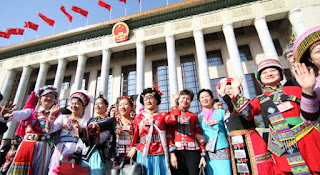Today's class was about a very interesting topic: Multiculturalism, which is the existence of diverse cultures in a society, we have to take into account that these groups can be or not accepted by the society laws. Often we can see groups that are recognizable, because the members share unique attributes (culture). In few words, they have their own identity, and they are recognized for these characteristics, but they are no always well seen, therefore the struggle for them to become normative (supported by the law).
History is filled with events that have marked this process. Women, for example, were mistreated the whole time, but they were recognized when they were given the right to vote. We can say that before this happened, they were just a group that had their own identity and culture. Same thing happened with the African American communities in the United States, they were oppressed due to the fact that in the past they used to be treated in the worst way possible and this idea did not change overnight. Years of fighting and raising their voice was what it took to finally be able to be part of a society as everyone is supposed to be.
To reach this conclusion, many themes were considered. A clear example is the Hegel and the masters and slaves dialect. It explains that we have to see people as individual and look at what defines their existence as a human being in order to be able to recognize one self and the nation. The next one is Rousseau's Model of dignity where we are not only recognized and love ourselves, this way we can create unity and equality. Additionally, the Meech lake accord would have allowed Canada its linguistic duality and to be considered a distinct society, but it also raised concerns on feminist and indigenous groups in the lack of citizen involvement in the accord. In the end, they fix the problem by providing protections for multicultural rights. Which takes us to the recognition of the country, with the 14 amendment the United States recognizes each individual by granting them citizenship and guaranteeing equal protection. On the other hand, the Dworkin liberalism allows people to choose how they want to live and respect others decision to fulfill the idea of a good life, making an environment of equality. To sum it all up, Charles Taylor in his study explains the Politics of recognition, all the information we just talked about gets to the conclusion that these groups are worth of dignity and self recognition. Equality and the law recognition is a valuable point to live in a multicultural society, we have to support every group or minority understanding who they are to avoid nonrecognition that causes more harm than good.














No hay comentarios.:
Publicar un comentario